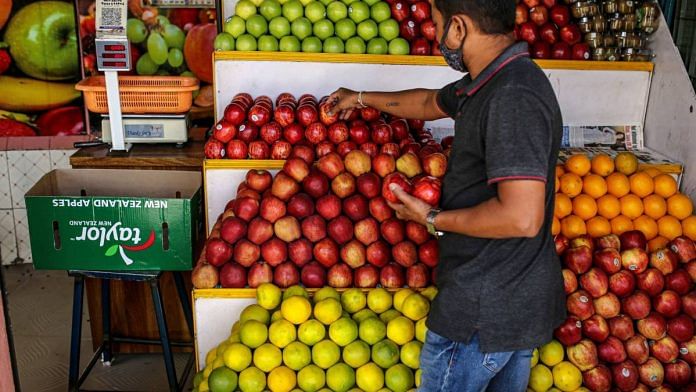New Delhi: Breakthroughs in genetic engineering and editing are critical to India achieving a sustainable agricultural system of low cost input and high yield, according to biotechnologist Dr Deepak Pental.
Noting that the growing population will lead to a considerable foodgrain requirement, Pental, a genetics professor and former vice chancellor of Delhi University, said there was an urgent need to push for research and development in Indian agriculture. He was speaking at the ‘Sustainable Agriculture Series’ hosted by Siraj Hussain, senior visiting fellow at the Indian Council for Research on International Economic Relations (ICRIER) Wednesday.
Pental said the national goal of reducing input cost while increasing output should focus both on reducing monetary costs involved in agriculture (such as chemical input and mechanical cost) as well as exploitation of natural resources (such as groundwater).
“India should be leading in agriculture R&D and sharing it with the world to be a leader in achieving the sustainable goal of no hunger. However, at the moment, unfortunately, the regulatory process is very stalled. My biggest worry is that we are descaling ourselves in important technologies,” said Pental.
India has invested a lot in agricultural subsidies, such as for irrigation and other inputs, but the country is not doing so well in terms of yield of foodgrain and oilseeds when compared against the global average yield and production benchmark, he added.
Also read: Why farmers are still having to protest for their right to sow GM seeds, even in a pandemic
Pesticide use vs genetic engineering
Discussing the reason behind the low crop yield in India, Pental said it was found that there is an intense pest and pathogen pressure on crops. There are only two solutions to this menace, according to him, one of which is enhanced application of pesticides. The other is to develop new plant breed technologies like genetic engineering or gene editing to make plants resistant to pests, pathogens as well extreme climate change while saving natural resources.
With increasing temperatures due to global warming creating more favourable environments for pests, leading to more attacks, an increased use of pesticides is becoming the norm. However, this also leads to exponential health implications. Which is why there’s a stronger case for genetic engineering, said Pental.
For example, the BT cotton crop not only eliminates its own pest and pathogen but also that of the chickpea and pigeon pea crop. This in turn provides what is called an ‘ecosystem protection’.
Dismissing concerns raised by activists, he added: “Major pests of mustard, like Alternaria, can only be dealt with gene editing or engineering. There’s no evidence of any impact of GM mustard on honeybees and honey as it’s a pressure put on by activists, which we buckle under. Gene similar to GM Mustard is present in canola cultivated in Canada, which also exports both honey and canola oil without any repercussions.”
Alternaria blight is a major mustard crop disease caused by the fungus Alternaria brassicae, which affects crop production by yield loss of up to 70 per cent.
“Countries like Canada and China who grow hybrid oilseed crops like mustard have double yield than us as they grow hybrid varieties crops developed by immense R&D investments. However, the technology to produce hybrid seeds in India is GM, which is still lying on the shelf,” said Pental.
With pest attacks on crops only set to increase in the future, Pental urged for more expenditure on R&D in agriculture, which currently accounts for just 0.3 per cent of the GDP.
Siraj Hussain, senior visiting fellow at ICRIER who was also present at the lecture, pointed out that India’s success in agri-export has been due to R&D investment in the sector. Rice varieties such as PUSA-1509, PUSA-1121, and sugarcane varieties such as CO237 developed by PUSA and Indian Council of Agricultural Research, are now being exported to many countries.
Pental also stressed on the need for a new trial policy when it comes to developing hybrid varieties. Under the current policy, those who breed new varieties are also the people overseeing its trials, creating a conflict of interest.
(Edited by Manasa Mohan)
Also read: Why Modi govt wants to distribute fortified rice & how it will help combat ‘hidden hunger’



